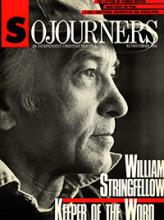We first met Bill Stringfellow in 1967 when, with our brother Dan, we went to Bill's Harlem apartment. Meeting us at the door, Bill was gracious but reserved.
We still recall the vividness of his bathroom walls and ceiling. The motif was a circus tent—all surfaces were draped with red-and-white-striped awning material. The circus was one of Bill's passions, and in his descriptions Barnum and Bailey were immortalized as never before.
Bill loved hats. He owned several emblazoned with circus markings and a summer straw hat he wore to greet the governor of Rhode Island on the governor's annual summer visits to Block Island. In the spring of 1984, Bill indulged the yearning of many years. He bought and wore an authentic Brooks Brothers bowler in which he looked stunning!
In 1970 Dan darted underground into hiding from the FBI, which sought him for his role in the Catonsville, Maryland anti-Vietnam War action, which also involved our brother Phil. Typically responding to human need, Bill and his friend Anthony Towne traveled from Block Island to Syracuse, New York, to offer support and solidarity to Mom Berrigan and us.
Outside our house lurked the FBI on 24-hour watch. Quickly our two friends told us, "Dan is due soon on Block Island, incognito. He needs rest and relaxation. We hope he'll be there for two weeks."
That visit brought to our home an enjoyable evening of serious talk marked with mirth and wry humor. We found that Bill and Anthony were personal and winsome to our young children, with whom they dialogued respectfully. As our guests assumed maturity in children, they had a knack for creating it. Our four were no exception.
Read the Full Article

